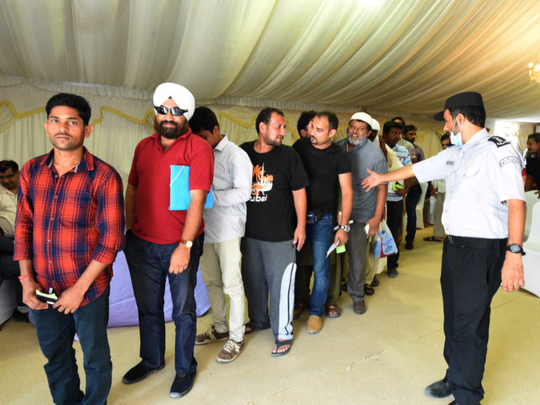
Abu Dhabi: The Indian Embassy received 4,497 passports of Indian nationals from the UAE authorities from 2011 to 2016, a senior Indian Embassy official said on Tuesday.
Employers must have submitted the passports to the UAE authorities after their employees absconded or businesses were closed down, said the official, on condition of anonymity.
Since most of these passports’ owners must be still living in the UAE, they can take advantage of the ongoing visa amnesty granted by the UAE, from August 1 to October 31. For the benefit of the amnesty-seekers, the embassy has published the list of all 4,497 passports on its website (www.indembassyuae.gov.in/docs/1.pdf), so people can access it without having to visit the embassy in person.
Since 2017, the embassy has not received such passports from the UAE authorities. Therefore, Indians who lost possession of their passports afterwards have to approach the amnesty centres, the official said.
The list indicates that some have already collected their passports from the embassy. However, most of them are yet to come forward and collect it, to either go back home or regularise their status without paying any fines during the amnesty period.
“We have shared the list of passports with all Indian community organisations in Abu Dhabi, which can help people who do not have internet access,” the official said.
He said the embassy has been coordinating with all community organisations, including the informal groupings that represent different regions of India. “People tend to be in touch with community leaders from their own region and they can help and guide amnesty seekers,” the official said.
The embassy has stepped up the efforts to raise awareness about the need to avail of amnesty among residency-law violators.
A mobile number at the embassy (050-8995583) and a toll-free number (80046342) of the Indian Workers Resource Centre, a support centre established by the embassy, will answer enquiries round-the-clock.
The embassy has also created a dedicated email ID (indemb.uaeamnesty18@gmail.com) for this purpose.
As Gulf News reported, the five Indian organisations registered with the UAE government had set up help desks to assist amnesty seekers. They can be contacted on the following numbers: India Social and Cultural Centre (ISC) (02-6730066), Kerala Social Centre (02-6314455), Abu Dhabi Malayalee Samajam (050-7035538 and 02-5537600), Indian Islamic Centre (02-6424488).
Many Indian violators left UAE before amnesty
Abu Dhabi: Many Indians in Abu Dhabi who violated residency laws had already left the UAE before the visa amnesty started on August 1, a senior Indian Embassy official told Gulf News on Tuesday.
“The embassy issued 566 emergency travel documents between January 1 and July 31, 2018,” said the official, who did not want to be named.
An emergency certificate [EC] is issued to those who do not have a valid passport, so they can leave the country. Some ECs were issued to Indian prisoners during regular visits made by embassy officials to prisons in Abu Dhabi, the official said.
The embassy has been regularly assisting Indians who had violated residency laws and those who wanted to leave the country were able to do so without further delay, he said. This could have contributed to the low turnout of Indian amnesty seekers in Abu Dhabi, in the first week of the amnesty period.
Not many Indian amnesty seekers have turned up in Abu Dhabi to collect their passports from the embassy or to apply for EC since Wednesday [August 1].
Those without passports have to apply for an EC at the BLS International centres, the embassy’s outsourced agency for visa and passport services. However, the number of those applying for EC has also been low, the official said, noting that only 50 amnesty seekers applied for ECs in Abu Dhabi and Al Ain as of Monday.
Amnesty-seekers who already have a valid passport can directly visit amnesty centres in Al Shahama, Al Ain and Al Dhafra to leave the country, or Tasheel centres to regularise their status. The number of Indians who approached these centres were not immediately available.







